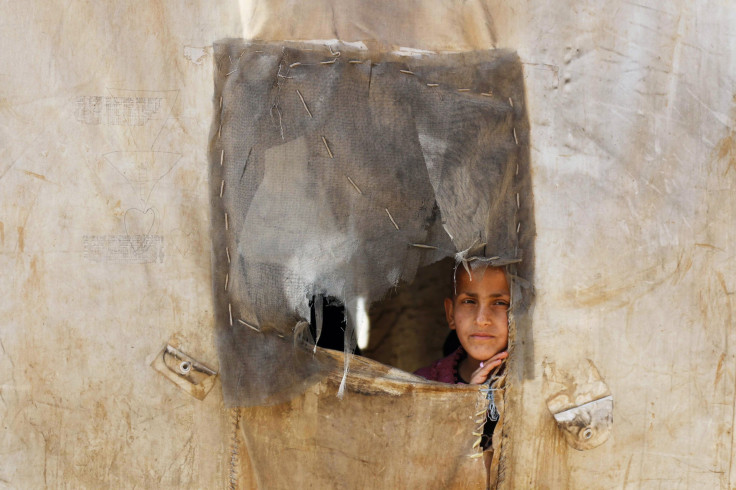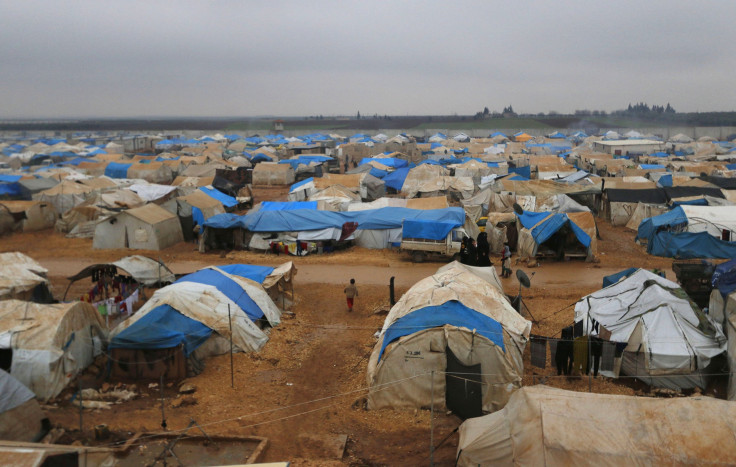Turkey Closes Border After Paris Attacks, Syrians Stuck Inside Unofficial Camps Without Doctors, Food

Syrians fleeing the Islamic State group and the political crisis in Syria are now unable to pass through official border crossings near Turkey, refugees in Europe told International Business Times. Suad, a 28-year-old woman from Idlib, Syria who is currently detained in Hungary, said the crossing she used to flee had been closed after the deadly attacks in Paris on Nov. 13. She said friends and family who tried to leave Syria this week were unable to pass through to Turkey and were forced to stay in a camp for internally displaced people.
In a report published this week, Human Rights Watch said Turkey had "all but closed its borders" to Syrian refugees, which is "summarily pushing back Syrians detected as they try to cross," the report said. The human rights organization interviewed 51 Syrians in Turkey who had fled airstrikes and other violence in Syria, all of whom said they could only enter Turkey using smugglers.
The recent terrorist attacks in Paris, during which 130 people died and hundreds more were injured, have exacerbated fear among European leaders that the Schengen Agreement, which allows unfettered travel across 26 European countries, is untenable.
French President François Hollande said in his news briefing with President Obama in Washington on Tuesday that Turkey needed to do more to stop the flow of foreign fighters with the Islamic State group, saying it is “a matter of urgency” to close the border between Turkey and Syria to prevent terrorists from reaching Europe.
Hollande's comments will likely only worsen an already desperate situation for refugees on the border of Syria and Turkey. One of the most notorious camps for internally displaced Syrians sits just next to the Bab al-Salama border crossing near the town of Azaz. Many Syrians have lived in the camp since 2012, when they were prevented from crossing into Turkey because they did not have identification.

The camp hosts now tens of thousands of people, most of who are from Aleppo, the country's second largest city, where rebels and the Islamic State group are fighting for power.
Syrians living in the camp do not have access to regular meals, though the World Food Program does operate there, and they can only see doctors sporadically. There is no one aid organization overseeing the camp, unlike the official refugee camps in Turkey. Most people sleep in makeshift tents made from pieces of cloth patched together with old United Nations logo material.
The Bab al- Salama border has been closed intermittently since 2013 as various rebel groups have tried to gain control of the crossing -- a major supply line into the heart of Aleppo. At one point, one of the largest and most powerful rebel groups in northern Syria tried to hand the operations of border crossing over to civilians, but that plan has since fallen apart.
Turkey began its most recent enforcement measures at unofficial border crossing points since the July 20 attack in the Turkish border town of Suruç.
The closing of borders won't stop the flow of foreign ISIS fighters, smugglers in Ankara told IBT last year. Syrians living in Antalya, Turkey who work in the smuggling business said ISIS foreign fighters are now crossing illegally into Syria by crawling under fences and crossing a river near Hacipasa, Turkey. According to one source, who asked to remain anonymous for safety reasons, each ISIS group has recruiters and smugglers who facilitate the crossings for the foreign fighters.
Civilians in Syria are also hiring smugglers to get them through the border to Turkey. Suad and her husband Sami paid more than $2,000 to get from Syria to Europe.
Turkey closing its borders will make it nearly impossibly for thousands of Syrians fleeing both the U.S. coalition and Russian airstrikes to get out of the country, unless they have thousands of dollars to pay smugglers.
“Turkey’s border closure is forcing pregnant women, children, the elderly, the sick, and the injured to run the gauntlet of Turkish border officials to escape the horrors of Syria’s war,” said Gerry Simpson, Senior Researcher and Advocate at Human Rights Watch in the report.
© Copyright IBTimes 2024. All rights reserved.





















